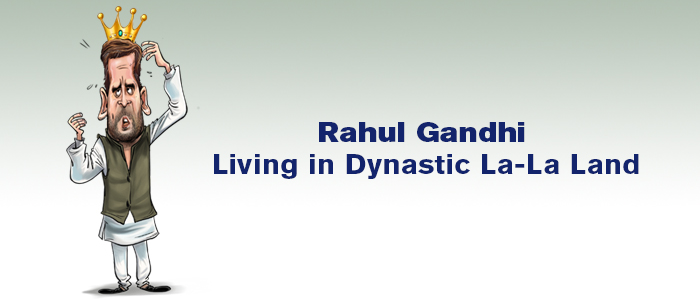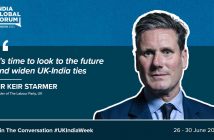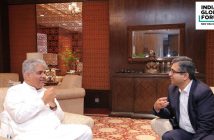India Inc. Founder & CEO Manoj Ladwa rips into Rahul Gandhi for belittling hardworking young Indians who are progressing on their merit, and says the wannabe PM needs to wake up from his dynastic la-la land.
I must confess that Congress Vice-President Rahul Gandhi’s meeting with students at the University of Berkeley, California, earlier this week has left me very confused – and more than a little disturbed. Did he say he was a dynast or a democrat? Did he insinuate that politics is his family business? And did he, or didn’t he, hint that the position of the Indian Prime Minister is an heirloom that is a part of his family legacy?
I’ll return to these questions in a moment, but first, the context. Gandhi was invited to speak on “India at 70: Reflections on the Path Forward” organised by the university. He is by all accounts the presumptive prime ministerial candidate of the Congress (India’s main Opposition party) or at least that’s how his followers view him, and he has not said or done anything to deny this ambition. Except that he has alluded to some vague “process” he apparently must follow before being coronated.
However unlikely that possibility may be, I was therefore expecting Gandhi to outline his vision for the country if he or his party were catapulted, against all odds, to power in New Delhi in future. It is well known that he and his party vehemently oppose almost every decision of the Narendra Modi government, so I, and many others like me, was expecting him to come up with cogent criticism of the BJP government’s policies as well as any alternatives that, in his views, would serve the country better.
As the leader-in-waiting in India’s main Opposition party, Gandhi is perfectly entitled to criticise the government and offer an alternative vision of governance. In fact, it is incumbent upon him to do so.
I didn’t see anything of that sort.
Instead, he launched into a vitriolic criticism of Narendra Modi personally and the ruling party. Nothing wrong with that either – but what left me confused and disturbed was the brazen and thoughtless way in which he found it necessary to belittle India and Indian society – before an audience that will doubtless, over the coming decades, throw up several leaders of international corporations, civil society organisations, multilateral agencies and even foreign governments.
One of the reasons why he was called to address the gathering at Berkeley – and here, I am only guessing, though I dare say it is a reasonable assumption – was that he represented the Opposition in the world’s largest democracy.
And how did he describe it? Reacting to criticism about him being a direct beneficiary of dynastic succession in the Congress party, he replied nonchalantly: “It’s a problem in all political parties in India. Most of the country runs like this, so don’t go after me, Akhilesh Yadav is a dynast, Mr Stalin is a dynast, Mr (Prem Kumar) Dhumal’s son is a dynast, so don’t just go after me… Even Mr Abhishek Bachchan is a dynast, also Mr Ambani, that’s what happens in India.”
Excuse me, did I hear/read that right?
Ram Nath Kovind, President of India, M. Venkaiah Naidu, Vice President of India, and the current Prime Minister were all born in very humble families and rose to their current positions through dint of dedication and hard work over many decades. India has a young demographic profile – about 65 per cent of the country is under 35 years of age.
Look at India’s successes in the IT industry, the space sector, in pharmaceuticals… look at any other field… they are all filled with people who have achieved their success the hard way, without powerful surnames or family connections. Rahul Gandhi’s brash assertion belittles all of them and ridicules their sacrifices to get to where they are.
And who did he compare himself with? Akhilesh Yadav and Stalin are dynastic successors in two of India’s regional parties that are steeped in corruption scandals and currently out of power in their respective states. Is the Congress Vice-President saying his party is like the other two?
And how can he compare the children of film stars and business tycoons with political successions? Cinema is the family business of the Bachchan clan. And Ambani runs India’s largest private sector company. The comparison is completely fallacious, unless… unless Rahul Gandhi is saying that just as many (albeit not all) business families the world over hand over the keys to the corner office, and with it, the wealth, power and prestige that go with the position to their designated heirs, his family has done the right thing by selecting several Congress presidents and Indian prime ministers from one bloodline only.
I find this all too disturbing. Gandhi articulates the crooked politics of the past, a pond which he feels comfortable to swim in, whilst neglecting the hard work and progress that many millions of young Indians seek on their own merit.
There are studies that show that Young India, the demographic group that makes up two-thirds of the Indian population, abhors entitlement. By completely obliterating the distinction between private enterprise and public life, the Congress scion may have unwittingly scored a self-goal. We’ll find out whether he has in due course.
I could go on. This speech and his responses to questions offer enough points to debate about, but for the limited purpose of my blog, I will focus on only two issues.
Gandhi accused the Modi government of encouraging crony capitalism. He said: “… India needs to turn a colossal number of small and medium businesses into international companies. Currently, all the attention in India is paid to the top 100 companies. Everything is geared towards them. Banking systems are monopolised by them, the doors of government are always open to them and laws are shaped by them.
“Meanwhile, entrepreneurs running small and medium businesses struggle to get bank loans. They have no protection and no support. Yet, these small and medium businesses are the bedrock of India and the world’s innovation. Big businesses can easily manage the unpredictability of India. They are protected by their deep, deep pockets and connections. But the real innovative strength of India lies with the millions of small firms and young entrepreneurs that run them…” I beg your pardon, Mr Gandhi, but haven’t you heard of the Mudra Scheme, which has provided loans to millions of small and micro businesses that have no access to the formal banking sector?
I beg your pardon, Mr Gandhi, but haven’t you heard of the Mudra Scheme, which has provided loans to millions of small and micro businesses that have no access to the formal banking sector?
And where was his concern for small and medium businesses when the government presided over by his family was selling priceless broadband airwaves and coal mines to a select cabal of corrupt businessmen closely linked to the Congress? The loss to the exchequer was in the region, give or take a little, of $50 billion.
I am not saying this. The Supreme Court of India had to step in to cancel the corruption-ridden allocations of airwaves and coal mines. His party bears direct responsibility for the resulting loss of global confidence in the Indian economy. And let me politely remind him, that it was the current Prime Minister’s credibility and tireless efforts that put India back on the global business map as what International Monetary Fund (IMF) chief Christine Lagarde describes as the “lone beacon of hope in this world.”
Now, allow me to turn to Gandhi’s apparent concern for the Indian poor. His party was in power for 10 years from 2004-2014. Why couldn’t he come up with a scheme like Jan Dhan Yojana, the largest financial inclusion scheme in the world that even the World Bank now wants to replicate in poor countries around the world with Indian help?
Gandhi made several other assertions I could join issue with, but won’t. Criticising the Prime Minister and the government is his job as an Opposition leader and I have no wish to argue against his right to do so. But as a Person of Indian Origin who engages with opinion formers around the world on Indian matters, I only wish he is armed better with facts and equipped with more intellectually rigorous arguments the next time he travels abroad. May be next time, the organisers of a Rahul Gandhi speech should issue an appropriate health warning to the audience before he opens his mounth!
God bless him, he needs to wake up from his dynastic la-la land.
Manoj Ladwa is the founder of India Inc. and chief executive of MLS Chase Group @manojladwa







